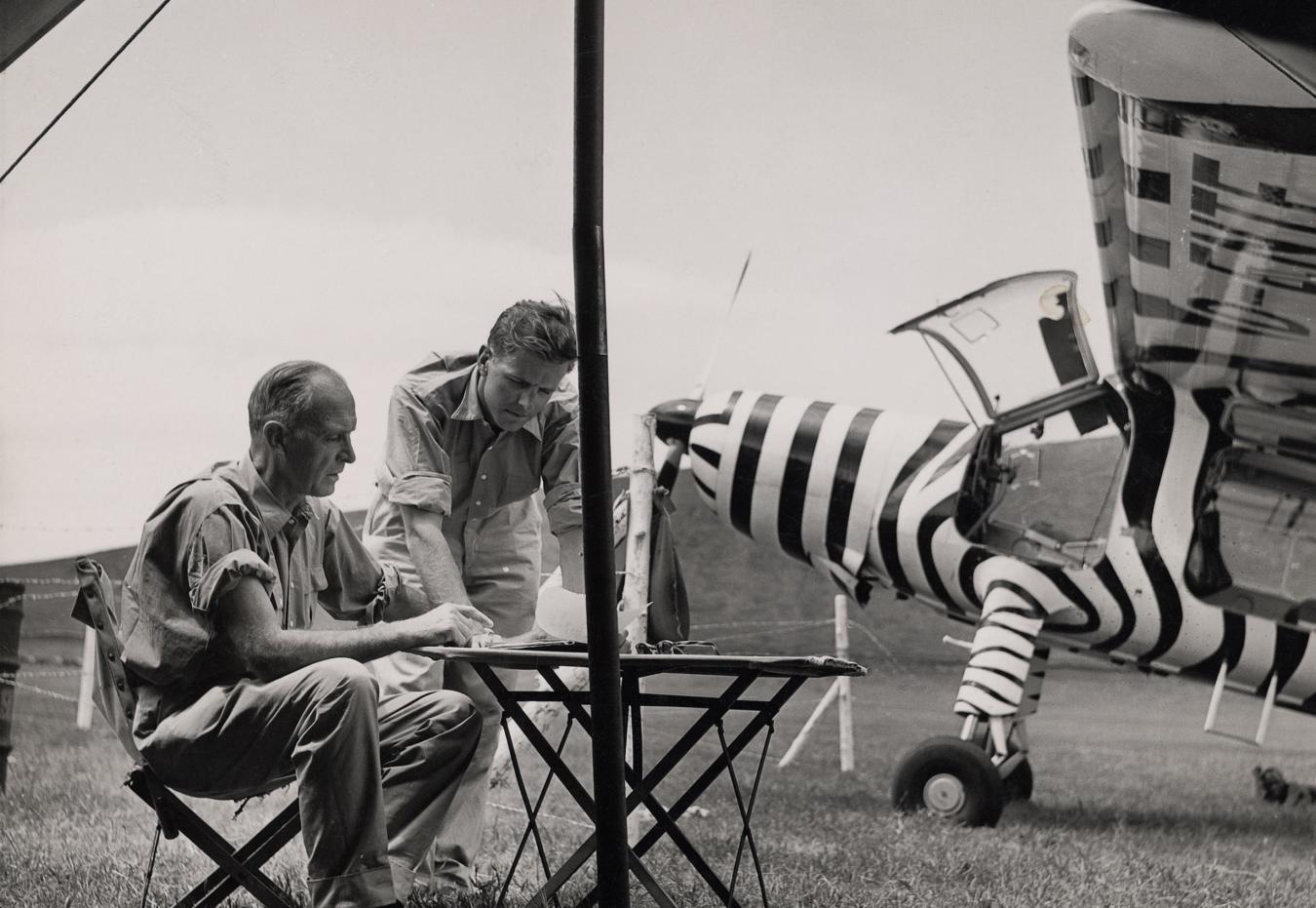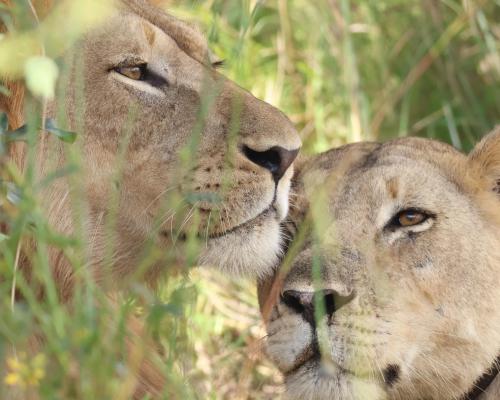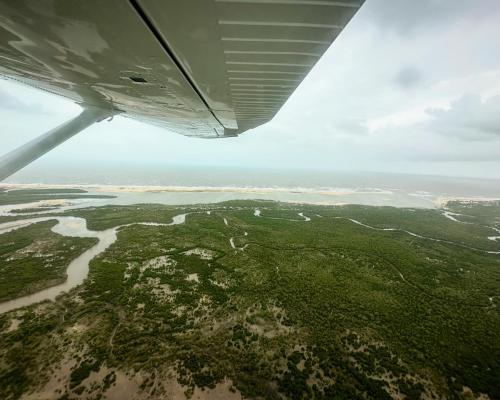
Picture in the title: Bernhard Grzimek (l.) and his son Michael in the Serengeti. © Okapia
Bernhard Grzimek was one of the key architects of nature conservation – both in Germany and abroad. In the 1950s he was already pointing out the problems that humanity would come to face: the massive extinction of species, the rapid loss of natural habitat, and the increasing demand for natural resources.
In Germany in particular, he turned nature conservation into a prominent issue and put it on the political agenda. He supported the first national park in Germany (Bavarian Forest), was the first commissioner for nature conservation of the German government, and co-founder of numerous environmental organizations.
His television shows, his magazine and his books aroused a keen interest in nature and animals in multiple generations. He laid the foundations for the green movement and helped popularize nature conservation in Germany
His efforts to protect the Serengeti National Park in Tanzania received worldwide attention. As an author and movie and television personality, he presented his conservation ideas and his personal convictions to an audience of millions. Many of his views have since become part of the scientific consensus, others need to be viewed more critically.
Bernhard Grzimek was born in Silesia in 1909. The young veterinarian arrived in Frankfurt shortly before the end of World War II. The city’s zoo had been completely destroyed, but he was appointed its new director in 1945. He invested a great deal of time in its reconstruction, attempting to make the enclosures as animal-friendly as possible. In doing so, he turned Frankfurt Zoo into one of the most modern zoos of its time. In 1950 he founded the “Gesellschaft der Freunde und Förderer des Zoologischen Gartens e. V.” (Society of Friends and Supporters of the Zoological Garden) to support the zoo. Years later this was renamed the “Zoologische Gesellschaft Frankfurt von 1858 e. V.” (Frankfurt Zoological Society).
Ever eager to cement the ongoing success of the zoo, Grzimek was constantly on the lookout for new species. In 1951, he embarked upon his first visit to Africa to learn more about the natural habitats of the continent’s wild animals and to return with some to Frankfurt Zoo. The first documentary films were made from the film recordings which Bernhard Grzimek and his son Michael made during these trips.
At the end of 1957, Bernhard Grzimek and his son Michael traveled from Egelsbach in Hesse to Tanganyika (now Tanzania) in a small zebra-striped plane with the registration code D-ENTE. The father-and-son team were keen to explore the great migration of wildebeest, zebra and antelope in the Serengeti. They counted wildlife from the aircraft window, flying over the Serengeti in pre-defined transects in order to cover the vast area. This was a new method at the time, and a similar form is still used today for large animal counts.
Tanganyika was still under the control of the British colonial government in 1959. Bernhard and Michael wanted to prove that its plans to change the boundaries of the Serengeti National Park would be fatal for the animals. Despite their global success with “Serengeti Shall Not Die”, which created a worldwide front against the border change, the policy was adopted in 1959 as originally planned. From today’s perspective, it was lucky for the great wildlife migration that Grzimek’s demands were not heeded.
At the time of their overflights, there were no large herds in the north of the national park. This led the Grzimeks to believe that this section was expendable to the national park. If the boundaries had been drawn up based on their proposals, wildlife migration routes in the north of the national park would have been cut off. Today, however, these are the main grazing grounds in the dry season and guarantee the animals access to the water of the Mara River.
The Grzimeks documented their work in the Oscar-winning film “Serengeti Shall Not Die” and the book of the same name. However, Michael Grzimek never lived to see its completion and success, because in January 1959 he had a fatal accident in the legendary zebra-striped airplane.
Bernhard Grzimek retained his links to Tanzania throughout his life. He was not only a vocal supporter of the Serengeti National Park, but also supported the first ranger school in Tanzania (“Mweka College of African Wildlife Management”). He also promoted conservation in other regions of the country, including Rubondo Island. His engagement in Tanzania marked the beginning of the conservation work of the Frankfurt Zoological Society.
Throughout his life, Bernhard Grzimek used his popularity to promote nature conservation and the protection of natural wildlife habitats. Not only in Africa, but in Germany, too. In the 1960s, he launched a campaign against the slaughter of baby seals in Canada and successfully protested the wearing of furs of endangered species. He fought against keeping chickens in battery cages and secretly stuck protest stickers on the menus of restaurants that were still selling turtle soup or frog legs.
His television show “Ein Platz für Tiere” (A Place for Animals), made by the Hessischer Rundfunk channel, attracted high ratings for 25 years. It was also Grzimek’s platform for raising funds for the conservation projects of the Frankfurt Zoological Society. Over time this evolved from merely supporting the zoo to become a fully-fledged conservation organization.
In 1969, Bernhard Grzimek became the federal government’s first commissioner for nature conservation (1969-73); he used this position to call for a federal nature conservation law. He was also a co-founder of WWF Germany and of Bund für Umwelt und Naturschutz (BUND), and president of the Deutscher Naturschutzring DNR (1964-68). In conjunction with Hubert Weinzierl he was instrumental in setting up the first German national park, the Bavarian Forest, which was officially founded in 1970. And together with Horst Stern he established the “Gruppe Ökologie”, which basically saw itself as a German version of the Club of Rome.
Bernhard Grzimek died in 1987 while at the circus in Frankfurt. His ashes were taken to Tanzania and buried next to his son Michael on the rim of the Ngorongoro Crater.
Bernhard Grzimek was promoting nature reserves and national parks at a time before anyone was talking about this. Today, we and other scientific organizations such as the IPBES (Intergovernmental Science-Policy Platform on Biodiversity and Ecosystem Services) and the Intergovernmental Panel on Climate Change (IPCC) are calling for the protection of intact, natural habitats. This will help us to meet major challenges such as climate change, species extinction and loss of biodiversity. More than 100 countries have already joined the call to place 30 percent of the planet under protection.
Grzimek also asked uncomfortable questions about the direction in which humanity was developing; questions that were later taken up by the Club of Rome and other institutions: How will our planet accommodate the growing population and its demand for natural resources? These are questions to which we need answers even more urgently today than we did then, and which require a global response.
In the middle of the 20th century, Bernhard Grzimek was instrumental in shaping nature conservation in Germany and in setting up the conservation work of the FZS. One of his core beliefs has since become the mission of our organization: We preserve wildlife and ecosystems, focusing on protected areas and regions of outstanding wilderness.
In 2006, the Frankfurt Zoological Society initiated a historical reappraisal of Bernhard Grzimek’s life. The Hamburg academic Claudia Sewig was given unrestricted access to the organization’s archives for this purpose. As a result she wrote the biography “Bernhard Grzimek – Der Mann, der die Tiere liebte” (The man who loved animals – Bastei Lübbe, 2009). Likewise, American historian Thomas Lekan was granted access to the FZS archive in order to conduct critical research on Bernhard Grzimek in preparation for his book “Our Gigantic Zoo. A German Quest to Save the Serengeti” (Oxford University Press, 2020).
Bernhard Grzimek used the large and small screen and also numerous books to convey not only his scientific expertise but also his personal opinions. Regardless of his achievements in the field of conservation, some of Bernhard Grzimek’s personal beliefs and individual actions are not compatible with the principles and values of the Frankfurt Zoological Society today.
Bernhard Grzimek joined the National Socialist Workers’ Party of Germany (NSDAP) in May 1937. He denied this after the war and explicitly claimed in his autobiography (“Auf den Menschen gekommen”, 1974) that he had never been a member of any party. Whether Grzimek was a member of the SA remains unclear to this day. There are various contradictory statements about this, but so far no historical evidence has been unearthed.
The Frankfurt Zoological Society condemns all forms of National Socialist ideology and racism. Bernhard Grzimek’s party membership, as well as his denial of membership after the war, are not compatible with the principles and values of the FZS, which include honesty and sincerity.
Both the biographer Claudia Sewig and the American historian Thomas Lekan concluded that Grzimek’s sole intention in obtaining such membership was to serve his professional career, and that there is no proof of his actively sharing National Socialist ideas.
In an interview with the newspaper Die Welt in April 2009, Sewig stated:
“After the war, it was investigated whether he had been a party member. He was ultimately deemed to have a clean record. This was partly because many anti-Nazis had interceded on his behalf. He was not a committed Nazi. There are no indications of such leanings in his writings – in contrast to Konrad Lorenz, for example.
He did not make racist or anti-Semitic remarks – quite the opposite, in fact. This is confirmed by all who knew him. Nevertheless, he did support euthanasia for those suffering from incurable illness. However, this was a widespread attitude at the time. It was not only Nazis who held such convictions. As for his politics, Grzimek was above all else a careerist. In 1937 he deemed that it was to his advantage to become a party member. He also had meetings with a number of prominent Nazis, but expressed little enthusiasm about them afterwards.
He later mused how he had the opportunity to kill Hitler because the Führer’s motorcade frequently drove past his office window. However, he would never have gone through with such a plan because he wanted to survive. He could not have participated in war crimes because he served in a special veterinary unit that took care of army horses.”
The Frankfurt Zoological Society distances itself from Bernhard Grzimek’s personal views on eugenics, which he set out in his autobiography (Auf den Mensch gekommen, 1974). His opinions are not compatible with the principles and values of the FZS, which include treating all people with respect.
Bernhard Grzimek’s achievements in the field of conservation were remarkable. He succeeded in sensitizing whole generations to its importance, and in generating a great deal of enthusiasm for the cause. From the 1960s until his death in 1987, he played a major role in turning the Frankfurt Zoological Society into a conservation organization – initially with just a handful of staff and a relatively modest budget.
Today, FZS is an international organization with over 1,200 employees and contributors in 18 countries. We invest over 20 million euros in nature conservation each year. People from diverse backgrounds work together to protect our planet. Their efforts are based on established scientific findings and internationally recognized and coordinated conservation methods and procedures. They are all committed to our underlying principles and values.











